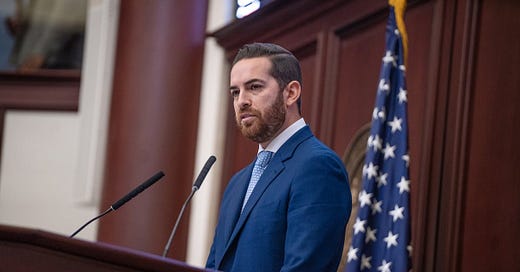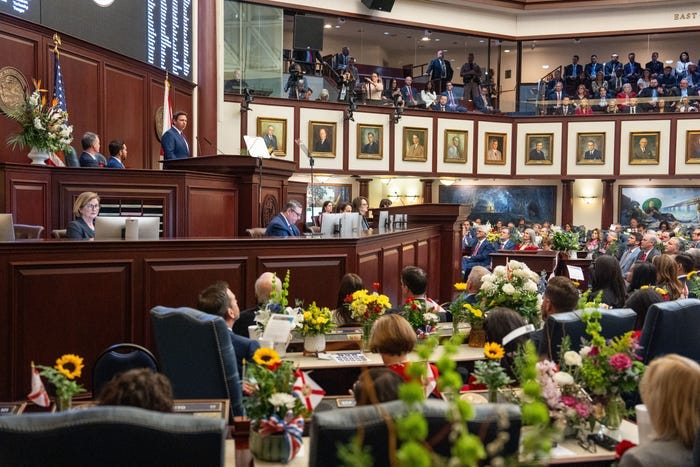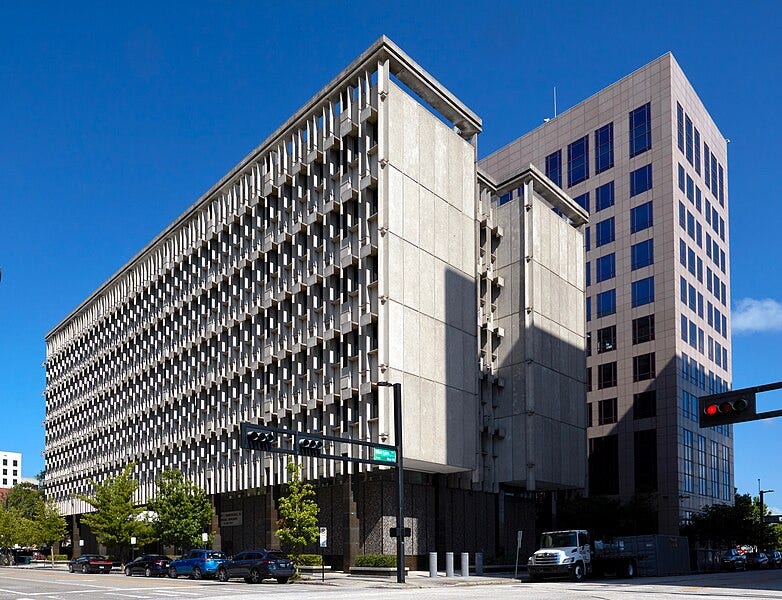Florida Lawmakers to Investigate Property Insurers & Propose Industry Reforms During 2025 Legislative Session
March 10, 2025 - Top Stories from Central Florida
Thanks for reading the Central Florida Times, an independent, reader-supported newsletter focusing on Central Florida and the Sunshine State. These are the top stories you need to know. To never miss an update, subscribe here:
Here’s the latest from Central Florida…
Florida House Speaker Orders Investigation Into Insurance Practices
As the annual legislative session kicked off last week, Florida House Speaker Daniel Perez (R-Miami) immediately directed a committee to investigate property insurance firms accused of shifting billions to affiliates while reporting losses. The move follows a recent Times/Herald exposé uncovering a 2022 state study, previously unreleased, showing insurers posted losses of $432 million from 2017 to 2019, while their affiliates raked in $1.8 billion. Perez criticized the industry’s “creative accounting” practices stating, “Policyholders deserve transparency.” The hearings, led by the House Insurance and Banking Subcommittee, will include subpoenas, witness testimony under oath, and external expert consultations. The report, commissioned by the Office of Insurance Regulation (OIR), highlighted how insurers had relationships with affiliates that were "not fair and reasonable,” shifting funds to these companies to bypass state-regulated profit caps. These practices coincided with the beginnings of Florida’s property insurance crisis, marked by skyrocketing premiums and legislative reforms making it harder to sue insurers. Governor Ron DeSantis defended previous insurance reforms and stated state regulators have expanded oversight of insurance affiliate relationships, but signaled an openness to doing more to enhance transparency. He rejected suggestions of undoing past changes such as those that increase restrictions on policyholders to file litigation on insurance companies. The American Property Casualty Insurance Association, which represents insurance companies, has also stated that it will work with lawmakers to ensure policy proposals are “based on facts and not sensationalized reporting.” The Subcommittee's findings will be pivotal in shaping legislation aimed at restoring fairness and transparency to Florida's beleaguered property insurance market.
State Lawmakers Target Insurance Industry Reforms
During the 2025 Florida Legislative Session, Republicans are setting their focus on property insurance industry oversight and consumer protections as the multi-year push to stabilize premiums and increase accountability continues. A key proposal from State Senator Blaise Ingoglia (R-Spring Hill) aims to address an insurance industry loophole–stopping executives of failed property insurance firms from jumping to new roles at affiliated companies. The bill follows a Times/Herald investigation revealing that 19 such executives had taken top roles at other insurers despite existing state regulations. Ingoglia’s bill would also increase insurers' minimum reserve requirements from $15 million to $35 million. Another proposal is directed at transparency. SB 1656, sponsored by Senator Jay Collins (R-Tampa) would require insurers to file detailed “transparency reports” breaking down costs like reinsurance, claims, legal fees, and profits. These reports would accompany rate requests submitted by state insurance regulators and would be publicly accessible online. The measure also aims to bring clarity to the relationship between insurance companies and their affiliate companies, which has come under scrutiny due to allegations of financial impropriety. These companies can bill insurers for services at prices that can be significantly greater than the real cost, which gives greater profits to executives and investors. In the recent Times/Herald report, some insurers were found to have collectively transferred billions to their affiliate companies while claiming financial losses, effectively obscuring finances and avoiding regulatory restrictions on excess profits. This practice is believed to have exacerbated Florida's ongoing property insurance crisis by inflating premiums for homeowners and undermining the financial stability of insurers. Other proposed bills would require state regulators to disclose insurance executives' compensation and company profits or losses. Furthermore, lawmakers want to provide more funding for the My Safe Florida Home program, which helps homeowners storm-harden their homes through upgrades to their windows, doors, and roofs. SB 1466 by Senator Nick DiCeglie (R-Indian Rocks Beach) would allocate 5% of sales taxes collected in hurricane-impacted counties during the two months following a storm to fund the program." Complementing this legislation is a separate bill by Sen. Ingoglia that would require homes benefiting from the program to see a reduction in insurance premiums.
Florida's New Immigration Policies Spark Labor, Economic Concerns
Florida's agriculture, construction, and hospitality industries are bracing for impact as changes in federal and state immigration policies threaten to exacerbate labor shortages. The state's reliance on migrant labor, particularly in agriculture, where immigrants make up 47% of the workforce, has business owners and experts sounding the alarm. Many farmers who rely on temporary migrant laborers through the H-2A visa program have seen costs skyrocket as subcontractors demand higher hourly pay–as much as 44% more from last year. The impacts are also likely to be felt in the construction and service industries, where immigrants constitute a significant portion of the labor force at 38% and 25%, respectively. The Hispanic Federation warns that aggressive immigration enforcement is driving people into the shadows, which could ultimately harm Florida's economy, creating further labor shortages, disrupting services, and driving up costs. A recent study by the University of South Florida found that the state's 2023 anti-illegal immigration law, SB 1718, has exacerbated job insecurity and financial strains for immigrants. That legislation introduced significant changes to Florida's immigration policies, including restrictions on state and local funding for community identification programs, expands the E-Verify program for larger employers, imposes criminal penalties on those transporting undocumented migrants into the state, limits on out-of-state driver's licenses for undocumented individuals, and mandated collection of immigration status data by Medicaid-funded hospitals. While Governor DeSantis and Republican lawmakers argue that stricter immigration policies are necessary, others contend that they will have unintended consequences. Some economists note that the new immigration laws will affect not just unauthorized immigration but also legal methods, such as certain visa programs, negatively impacting tourism and hospitality in the state. According to the Institute on Taxation and Economic Policy, unauthorized immigrants contributed $1.8 billion in state and local taxes in Florida in 2022.
Florida's 2025 Environmental Laws Take Shape
Florida lawmakers kicked off the 2025 session last week, tackling a slew of environmental proposals over the next 60 days. Here’s what’s on the table:
State Park Preservation Act: Bans hotels, golf courses, and other non-conservation structures or amenities in state parks, limiting activity to “conservation-based” recreation like hiking, after Gov. DeSantis’ shelved development plan at state parks sparked bipartisan uproar.
Nature-based Coastal Resilience: Requires the University of South Florida College of Marine Science to develop natural solutions for coastal resilience, such as replanting mangrove trees and bolstering oyster reefs. It also proposes the Florida Department of Environmental Protection (FDEP) study and adopt rules for natural coastal protection solutions.
Former Phosphate Mining Lands: Offers legal protection to phosphate mining firms like Mosaic from pollution lawsuits tied to environmental damage, raising concerns among eco-groups about accountability. Reports indicate Mosaic paid lobbyists to draft the bills and donated to the lawmaker sponsoring the bill.
Safe Waterways Act: Transfers responsibility for testing waterways for bacterial pollution from the state health department to the FDEP.
Regulation of Auxiliary Containers: Prevents local governments from regulating single-use plastics or reusable containers, giving the state government authority instead.
Public Service Commission: Caps utility profits, adds oversight, and increases transparency in executive compensation.
Water Management Districts: Enhances legislative oversight of water management districts and Everglades restoration costs, allowing lawmakers to scrutinize projects and potentially reject those using state funds.
Farm Bill: Broad legislation that bans drone harassment on private, agricultural, and hunting lands, prohibits certain water additives such as fluoride, and eases application processing for concealed weapon permits.
Resilient Buildings: Offers tax credits for buildings with Leadership in Energy and Environmental Design (LEED) certificates, promoting resilient construction and hurricane hardening.
Lawmakers Propose Ban to Weather Modification in Florida
Lawmakers have proposed legislation to ban weather modification activities in Florida, prohibiting cloud seeding or geoengineering designed to alter atmospheric conditions such as temperature, rain, fog, or sunlight intensity. Sponsored by Sen. Ileana Garcia (R-Miami), SB 56 cleared its first legislative hurdle in February, passing the Senate Environmental and Natural Resources Committee in a 6-3 vote. It would repeal 11 existing statutes regulating weather modification and increase fines for violations from $500 to $100,000. It would also strip the Florida Department of Environmental Protection's power to conduct studies, research, and tests about changing the weather. "However, the Miami Republican has temporarily postponed the bill’s scheduled hearing before the Appropriations Committee on Agriculture, Environment, and General Government. Garcia introduced the bill in response to public concerns over unexplained weather phenomena and health risks, particularly following the 2024 hurricane season that saw back-to-back major storms impact Florida. Some widely spread theories claimed that the government was using advanced technology to manipulate weather patterns, suggesting that hurricanes were artificially intensified for political or financial gain. “Some would call it concerns. Others would call it conspiracy theories,” she said during a prior committee hearing. Garcia acknowledged some weather modification concerns stem from conspiracy theories about “chemtrails,” but she argued the bill provides a starting point to “separate fact from fiction.” While the bill doesn't explicitly mention "chemtrails," it does reference conspiracy theories surrounding contrails and points to evidence that weather manipulation is an ongoing practice. Sen. Garcia added that Florida has had weather modification licensing rules for more than a decade, yet no applications have been submitted in that time.
NOAA Firings Spark Concerns Over Hurricane Preparedness, Weather Forecasting Capabilities
Hundreds of National Oceanic and Atmospheric Administration (NOAA) employees, including meteorologists responsible for local forecasts at the National Weather Service (NWS) and staff at the National Hurricane Center (NHC), were terminated late last month as part of the Trump administration's efforts to reduce the federal workforce. The layoffs, affecting probationary staff, have raised alarms about potential impacts on weather forecasting and public safety. The cuts affected about 10% of NOAA’s workforce, with two rounds of layoffs impacting roughly 1,300 employees. The NHC, which is responsible for tracking and predicting hurricanes, has lost two flight directors and one electronics engineer, which could diminish its ability to collect, manage, and disseminate data needed for accurate forecasts during the upcoming hurricane season. Following these layoffs, the National Hurricane Center's flight director staff, responsible for the safety and collection of meteorological data during the specialized airborne hurricane hunting missions, has been reduced to six individuals. This reduction is expected to impact the continuity of 24-hour operations during major hurricanes and necessitate the grounding of some flight missions, which occur twice-daily. Consequently, this may lead to less precise and frequent forecasts, as well as delayed warnings regarding a storm's projected path and landfall location. Weather experts warn of further impacts that could jeopardize recent advancements in hurricane analysis and modeling, which have been credited with saving billions of dollars in storm-related costs. A 2024 study by the National Bureau of Economic Research found that improved forecasts led to hurricane-related costs dropping 19%--an average of $5 billion in savings per storm due to better emergency preparedness.
DOGE Closes Federal Offices Across Florida
The Department of Government Efficiency (DOGE) is ending several federal office leases in Florida, impacting thousands of potential jobs as part of a broader cost-cutting initiative led by the Trump administration and Elon Musk. The closures include the U.S. Army Corps of Engineers’ Florida headquarters in Jacksonville and the U.S. Attorney’s Office in Tampa. The Jacksonville office houses around 800 employees dedicated to Everglades restoration and Florida’s coastal maintenance, and received notice to vacate by August–two years ahead of the lease’s expiration. DOGE claims this closure will save taxpayers $9.3 million but has yet to clarify where displaced specialized workers will relocate. Concerns arise about the uncertain future of the ongoing $23-billion Everglades restoration effort that is the largest environmental restoration project in the world. Meanwhile, the Tampa office’s 108,000-square-foot space costs nearly $2.8 million annually, with DOGE projecting over $3.2 million in savings by terminating the lease. Other federal buildings in Florida scheduled to shutter include the U.S. Fish and Wildlife Service in Doral, the Bureau of Indian Affairs in Hollywood, the Florida Keys National Marine Sanctuary in Key Largo, and the South Florida Ecosystem Office for Everglades National Park in Homestead. “Selling the properties ensures taxpayer dollars are no longer spent on vacant or underutilized federal space,” the General Services Administration stated, adding that funds will be reinvested in improved work environments.
Florida Considers First Black Bear Hunt in 10 Years, Public Input Sought
For the first time in nearly 10 years, Florida wildlife officials are considering reinstating a black bear hunt. The Florida Fish and Wildlife Conservation Commission (FWC) cites a growing bear population, now estimated at over 4,000, as a reason to revisit the controversial practice. The last hunt, held in 2015, saw strong participation and was abruptly halted after just two days when hunters exceeded quotas, killing more than 300 bears. Opponents argue the state has not conducted a population survey since then and question whether a hunt is necessary. Regulated black bear hunting in Florida spanned from the 1930s until 1994. The Commission claims several bear subpopulations are stable enough for hunting and has directed staff to develop proposals on organizing another hunt. FWC held a virtual public meeting on March 13 to gather feedback and accept comments. The more than 500 participants that tuned in were asked to provide comments on how a hunt would be conducted—not if a hunt was a good idea. Over 3,700 comments were provided, largely voicing opposition to the potential hunt, in defiance of wildlife officials’ requests. Wildlife advocates oppose a possible hunt, arguing vehicle strikes have controlled bear numbers, with 2,600 deaths by cars since 2014. Proponents argue this measure could mitigate human-bear conflicts, which reached a record high in 2024, with 150 reported incidents of threats, attacks, or injuries. The FWC plans to review hunting proposals at their next public meeting on May 21-22 in Ocala where comments will again be accepted. Additionally, feedback can be provided by the public via email at BearComments@MyFWC.com. Last year, Gov. DeSantis enacted a law permitting residents to kill bears in self-defense or when they pose a threat to pets or property.
Florida Supreme Court to Hear Challenge to Tampa Electric Rate Hike
Consumer advocacy groups have appealed Tampa Electric’s rate hike to the Florida Supreme Court, which is required to hear the case. Florida Rising and the League of United Latin American Citizens filed the appeal, arguing the rate structure unfairly shifts costs from large corporate users to residential customers and small businesses. Despite recommendations from its staff to reject the cost shift, the Florida Public Service Commission approved Tampa Electric’s plan. The Office of Public Counsel has also requested reconsideration of the decision. The approved rate hikes, which began in January, are projected to raise $281 million over three years, adding $9 to $13 to average monthly bills. Separate storm-related costs from last year’s hurricanes are also expected to increase monthly bills by about $20.
State Senator Pushes for Improved Stormwater Maintenance After Hurricane-Induced Flooding
To help prevent devastating flooding experienced last year in the wake of Hurricanes Debby, Helene, and Milton, Florida State Sen. Danny Burgess (R-Zephyrhills) has proposed a bill–SB 810–requiring local governments to inspect stormwater systems annually. The inspections would cover canals and drain pipes, with results reported to the Florida Department of Emergency Management by June 1, coinciding with the start of hurricane season. The move comes after infrastructure failures and overwhelmed drainage systems were identified as contributing factors to widespread flooding around Tampa Bay during the 2024 hurricane season. Senator Burgess, representing parts of Pasco and Hillsborough counties, aims to improve flood prevention and emphasized the importance of preparedness in light of recent flooding events. The move comes after infrastructure failures were identified as contributing factors to widespread flooding during Hurricanes Helene and Milton in 2024. The proposed legislation faces high odds of becoming law as it has only been introduced in the Florida Senate and lacks a companion bill in the House.
MLB Players Union Monitors Rays Ownership Amid Stadium Uncertainty
Amid rumors of a potential sale of the Tampa Bay Rays, MLB Players Association chief Tony Clark emphasized the union’s focus on team success rather than ownership changes. As players express concerns about team amenities and long-term stability as they prepare to play the 2025 season at Steinbrenner Field in Tampa, Clark dismissed weighing in on Rays owner Stuart Sternberg’s reported consideration of selling the team. “We’ll let the league handle those concerns,” Clark said. The club faces challenges as they prepare to play home games at the New York Yankees’ spring training open-air stadium after Hurricane Milton inflicted damage at Tropicana Field. The Tampa Bay Rays’ new proposed $1.3 billion stadium in downtown St. Petersburg is in limbo. The team remains at odds with the city and Pinellas County over an alleged $150 million shortfall in the project–costs the Rays say they can’t cover.
Thanks for reading this edition of the Central Florida Times. To never miss an update, subscribe for free:
In the meantime, if you learned something or found this read interesting, please consider sharing it to grow our community!










